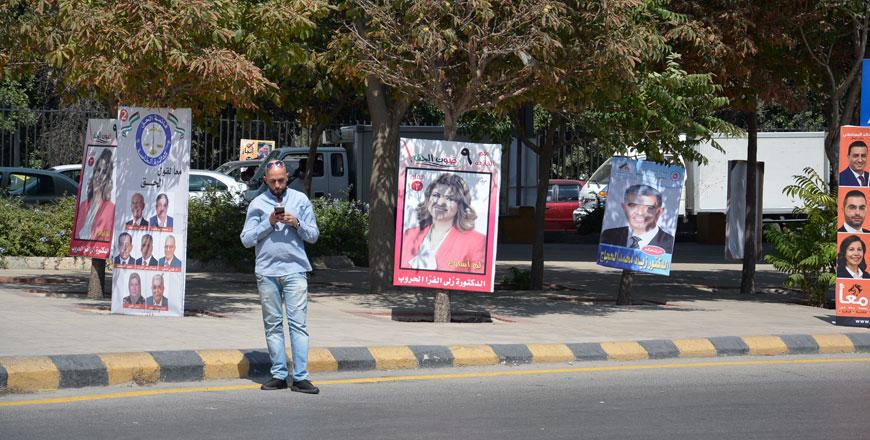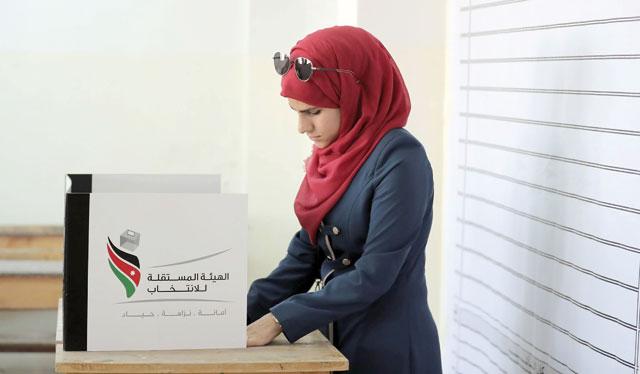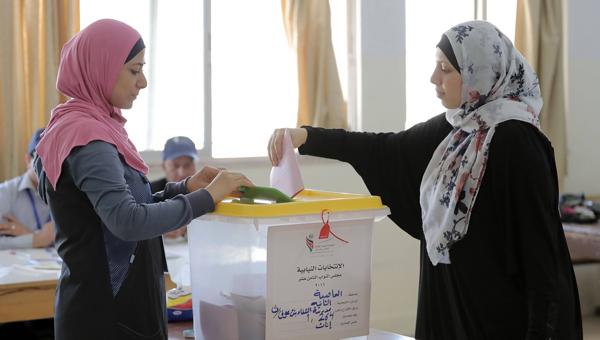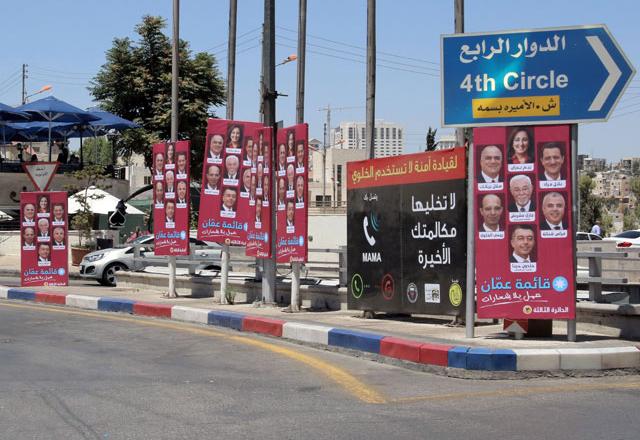You are here
Activists expect at least three female Islamist MPs in next Parliament
By Rana Husseini - Sep 20,2016 - Last updated at Sep 20,2016

Electoral campaign posters line a street in Amman recently (Photo by Amjad Ghsoun)
AMMAN — Women’s rights activists are standing by their August predictions that a maximum of three women could clinch seats outside the women’s quota, which guarantees 15 female MPs in the new Lower House of Parliament.
Activists also speculated that a minimum of three female MPs will come from lists for the Islamic Action Front (IAF), the political wing of the banned Muslim Brotherhood.
“I don’t believe that we will have more than three women win outside the quota, and if I want to be more optimistic, I would like to see 20 women under the Dome,” said the head of the Women’s Committee at the Senate, Senator Mai Abul Samen.
“Women were placed on the electoral lists in a cosmetic way, and if the quota did not exist, I do not believe that we would see many women,” Abul Samen told The Jordan Times.
“I believe many male candidates will benefit from people who are planning to vote for women in their lists,” Abul Samen contested.
In Tuesday’s Lower House election, 1,252 candidates are running, including 920 Muslim males, 245 Muslim females, 58 Christian males, five Christian females, 22 Circassian and Chechen males and two Circassian and Chechen females, according to official figures.
Women’s rights activists have repeatedly criticised the Election Law, saying it was difficult to understand and limits governorates with high populations to one female candidate.
Women’s rights groups launched several campaigns before the law was passed, asking the government and Parliament to increase the number of seats for women in governorates with multiple districts — Amman, Zarqa and Irbid — but their calls were not considered by the government or the legislative body.
Another issue that candidates faced this election was the short period between the announcement of the election date and the polling day, which was around three months, according to Jordanian National Commission for Women (JNCW) Secretary General Salma Nims.
This is a short period, which did not enable us to reach the majority of female candidates who are running for elections,” Nims said.
Nevertheless, she added that despite the difficulties, “of the over 300 women trained by the JNCW, 91 decided to run for elections”.
Meanwhile, an activist, who preferred not to be identified, said she feared that “three Islamist female candidates from the IAF will be elected and that they will not work for women’s rights”.
“The speculation is that around 15 Islamists, including three women, will win seats in the upcoming elections, and history has taught us that when some of these women were in the Lower House they voted against laws in favour of women,” the activist told The Jordan Times.
She added: “I hope that the quota will be cancelled in the near future so that it will not facilitate the wins of women who will work against women’s causes.”
But the executive director at the Sisterhood Is Global Institute and former minister Asma Khader disagreed with the activist, saying that “many of the women at the IAF have adopted some issues that the women’s movement has been demanding in recent years”.
“The women in the IAF have adopted our demands to repeal Article 308, which cancels the punishment of a rapist who marries his victim, and they also embraced the demands for Jordanian women married to non-Jordanians to pass on their citizenship to their children,” Khader explained.
She told The Jordan Times that she expects “one-third of the women who will win seats via the quota or direct elections to come from the IAF”.
Activists have complained over the years of many factors that have hindered women from running in elections and publicising their campaigns, such as financial constraints, tribes or families who are still not convinced that women belong in Parliament, and who believe that a woman’s place is at home and in the kitchen.
The Elections Law is based on an at-large voting system, in which candidates can run for parliamentary elections on one large multimember ticket.
The law divides Jordan into 23 electoral districts, with one district for each governorate, while the capital contains five districts, Zarqa has two and Irbid has four.
The number of MPs as per the new Elections Law will be 130.
Under the proportional electoral system, winning lists will be allocated seats according to the percentage of votes they receive. The seats will be distributed to the ticket members with the most votes.
Each voter can only pick one list and must then select a candidate or candidates from the ticket.
Related Articles
AMMAN — Activists on Thursday expressed mixed reactions to the parliamentary election results, as five women won seats outside the 15-seat q
AMMAN — Voters and activists in Amman on Tuesday stressed the importance of electing qualified women to the Lower House, noting that female
AMMAN — The women’s movement has expressed optimism that some female parliamentary candidates could clinch seats outside the 15-seat designa


















